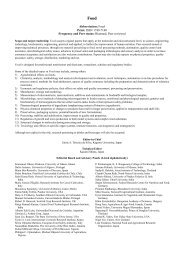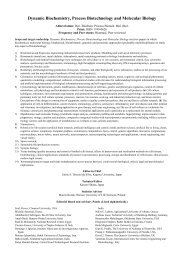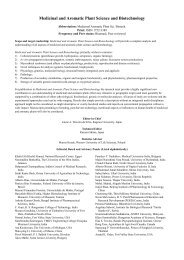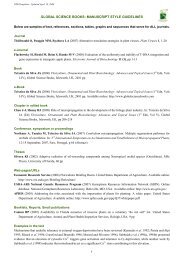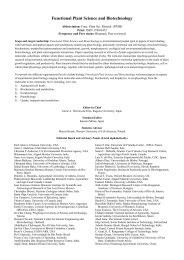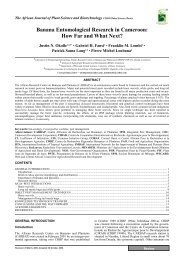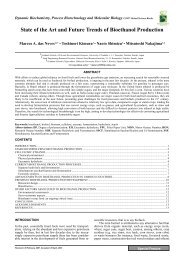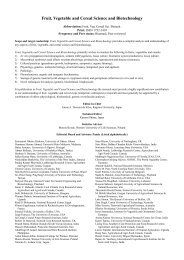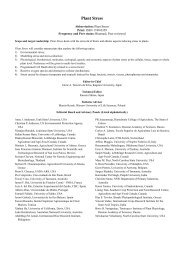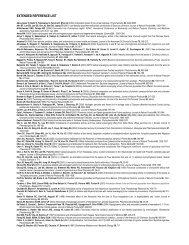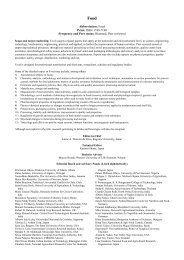Tree and Forestry Science and Biotechnology - Global Science Books
Tree and Forestry Science and Biotechnology - Global Science Books
Tree and Forestry Science and Biotechnology - Global Science Books
You also want an ePaper? Increase the reach of your titles
YUMPU automatically turns print PDFs into web optimized ePapers that Google loves.
<strong>Tree</strong> <strong>and</strong> <strong>Forestry</strong> <strong>Science</strong> <strong>and</strong> <strong>Biotechnology</strong><br />
SPECIAL ISSUES: CITRUS II (Guest Editors: Paula Tennant, Noureddine Benkeblia (University of the West Indies,<br />
Jamaica)) ~ March, 2009<br />
Special Issue 1<br />
Farhat Abbas, Ali Fares (USA) Best Management Practices in Citrus Cultivation (pp 1-11)<br />
ABSTRACT<br />
Invited Review: There are growing concerns about the environmental impact of intensive agricultural production including<br />
citrus cultivation on our natural resources, i.e., water resources. In addition to enhancing citrus tree growth, fruit yield, <strong>and</strong><br />
quality of citrus orchards, the properly adopted citrus best management practices (BMPs) should help protecting our<br />
environment. Thus, the goals of citrus BMPs are to integrate different approaches to optimize irrigation water <strong>and</strong> minimize<br />
surface- <strong>and</strong> sub-surface transport of nutrients <strong>and</strong> pesticides, <strong>and</strong> control citrus related pests, weeds, <strong>and</strong> disease attack. This<br />
article reviews the major citrus BMPs including: i) citrus irrigation management, ii) citrus nutrient management, <strong>and</strong> iii) citrus<br />
pests, weeds, <strong>and</strong> disease control. Environmental impact of citrus cultivation on our water resources, if the recommended<br />
BMPs are not properly adopted, are also discussed. The information presented in this article should help scientists,<br />
professionals, <strong>and</strong> citrus growers adopt the recommended BMPs for sustainable citrus cultivation.<br />
Ali Fares (USA) Citrus Irrigation Scheduling (pp 12-21)<br />
ABSTRACT<br />
Invited Review: As the major water user, irrigated agriculture is expected to make substantial changes to optimize its water use.<br />
Ample research findings in the literature show that an efficient irrigation scheduling reduces production cost, improves crop<br />
yield, limits erosion <strong>and</strong> sediment loading, <strong>and</strong> enhances environmental quality. A successful irrigation water management<br />
program optimizes water availability, while ensuring the best crop yield <strong>and</strong> quality at the lowest cost to the producer. Irrigation<br />
scheduling is generally meant to calculate the exact amount <strong>and</strong> timing of irrigation to be applied to the field based on the crop<br />
irrigation water requirements. This review manuscript discusses the following sections: i) soil <strong>and</strong> its major physical properties<br />
that influence irrigation scheduling, ii) measurement of some of soil physical properties iii) rainfall characteristics (amount,<br />
intensity <strong>and</strong> distribution) <strong>and</strong> their effect on irrigation scheduling, iv) citrus crop properties that influence water uptake (root<br />
system <strong>and</strong> crop growth stages <strong>and</strong> parameters, crop water uptake across the growing season), v) irrigation techniques used in<br />
citrus, vi) different citrus irrigation scheduling techniques, <strong>and</strong> vii) an outlook of future research in citrus irrigation scheduling.<br />
Ali Fares, Farhat Abbas, Sanjit K. Deb, Siva Paramasivam (USA) Citrus Chemigation (pp 22-31)<br />
ABSTRACT<br />
Invited Review: Advances in microirrigation techniques have facilitated greater adoption of chemigation in citrus production.<br />
Citrus chemigation is the application of liquid chemicals, i.e., fertilizers, pesticides, <strong>and</strong>/or herbicides to citrus groves through<br />
irrigation systems. This article reviews citrus chemigation; it discusses chemigation management, chemigation system<br />
components, <strong>and</strong> chemigation efficiency under citrus production systems. Pressurized irrigation systems, e.g., overhead<br />
sprinklers, microsprinklers, <strong>and</strong>/or drip systems have successfully been used to carry out citrus chemigation. Through<br />
chemigation practices, citrus growers have been able to control the timing <strong>and</strong> the amount of chemical application to their<br />
groves. Selection of suitable irrigation system, use of efficient injection devices, <strong>and</strong> compatibility of chemicals are crucial for an<br />
efficient chemigation operation. Combined use of incompatible chemicals could form insoluble compounds <strong>and</strong>/or precipitates<br />
that may clog the chemigation system.<br />
Anoop Kumar Srivastava (India) Integrated Nutrient Management: Concept <strong>and</strong> Application in Citrus (pp 32-58)<br />
ABSTRACT<br />
Invited Review: Multiple nutrient deficiencies are common in citrus orchards the world over. Integrated nutrient management<br />
(INM), a concept that involves the combined use of chemical fertilizers, microbial inoculation <strong>and</strong> organic manures, has shown<br />
much better promise than any of the other strategies of fertilization in citrus. INM-based fertilization has a definite edge over



